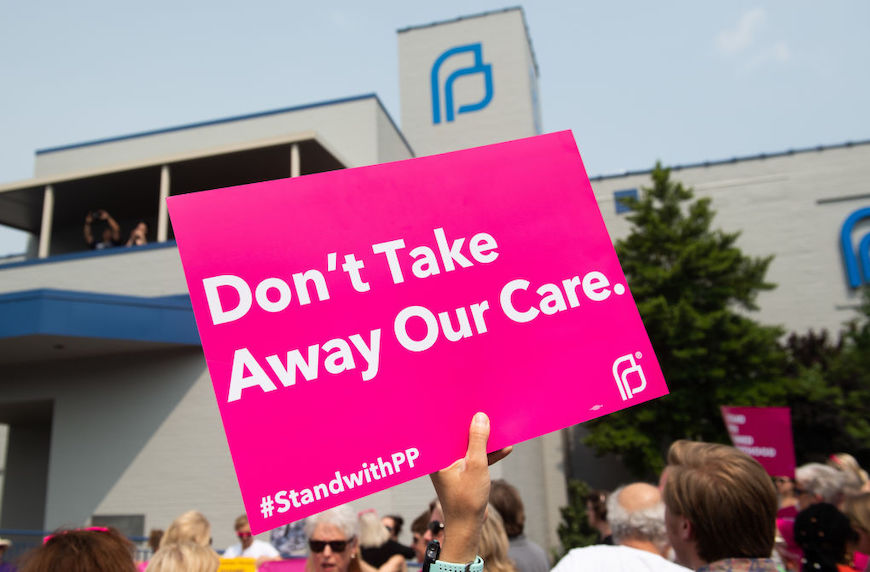The law requires health professionals to check fetal cardiac activity before having an abortion – something that can be detected around six weeks pregnant. If such activity is detected, the law says it would be illegal to have an abortion, with very few exceptions. Although the person receiving the abortion is not legally punished for violating this law, the abortion provider would be charged with a crime and fined $ 10,000, sentenced to prison for up to two years, or both.
There are several obvious problems with banning abortion in South Carolina that serve primarily to make access to abortion incredibly difficult. On the one hand, those who are sexually abused are not exempt from this law, unless their abortion provider reports their assault to law enforcement officials – which Rachel Fey, senior director of public policy at Power to Decide, points out is a violation of doctor-patient confidentiality. Fey also notes that many people don’t even know they are pregnant six weeks after conception (which would be right after their first period), which means that this law essentially tries to deprive South Carolina residents of their choice and access, period .
The fact that the courts prevented the law from coming into force is not surprising, says Fey, since it directly challenges the precedent set by Roe v. Wade—The 1973 Supreme Court decision that confirmed abortion was a right protected by the Constitution. In other words, South Carolina’s six-week ban is unconstitutional.
“I see no light at the end of the tunnel for states that continue to promote these laws.” —Rachel Fey, Power to Decide
The state is not the first, however, to try to pass such a law. Mississippi currently has an abortion ban 15 weeks after conception, which has also been temporarily blocked by the courts. This case is now reaching the Supreme Court, which has not yet agreed to hear it. Georgia, Louisiana, Kentucky, Missouri and Ohio also have similar laws on books, and, according to the Center for Reproductive Rights, states have introduced or filed more than 200 bills designed to restrict or prohibit abortion only in last two months. (It does not help that the pandemic has been used as a pretext by lawmakers to restrict access, including a ban on the use of telemedicine for medical abortion.)
Fey warns that we can probably expect to see similar efforts to prohibit or excessively restrict access to abortion in other states, now that the conservative majority in the Supreme Court is even greater, which means that theoretically there is a greater chance of making the Supreme Court narrow the gap. scope of Roe v. Wade or take it down completely. “I see no light at the end of the tunnel for states to continue to promote these laws,” she says. After all, Supreme Court justices are appointed for life.
Any attempt to restrict access to abortion, adds Fey, disproportionately affects low-income individuals. And, as a result of systemic racism in this country, this means that BIPOC populations are subsequently affected more significantly than white populations. Furthermore, as these laws are now in the judicial system, and not in the legislation phase, there is not much that we as individuals can do to influence their destiny.
This does not mean, however, that nothing to be done if you – like many Americans – support the right to abortion. If you live in a partial state with restrictions on abortion, defending and voting for legislators who don’t is crucial. Fey also says that you should also pay attention to what is happening with the Hyde Amendment, a 1970s federal law that prevents federal tax dollars (including federal Medicaid money) from being used to finance most of the attention abortion. “There is a major effort to ensure that the Hyde Amendment is eliminated from federal funding legislation, meaning that it would need to be eliminated from President Biden’s budget, ideally, and that Congress should not pass appropriation bills that include the Hyde Amendment. ”To defend this, Fey recommends contacting your representatives in Congress.
While laws like the one South Carolina tried to enact last week are alarming, Fey emphasizes that abortion remains legal in South Carolina and in all fifty states. If you need help accessing care, she recommends using Power to Decide’s Abortion finder.
Oh hi! You look like someone who loves free exercise, discounts for favorite cult wellness brands and exclusive content from Well + Good. Sign up for Well +, our online community of wellness experts, and unlock your rewards instantly.
